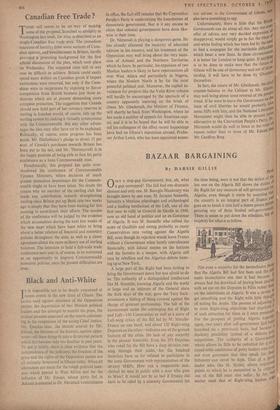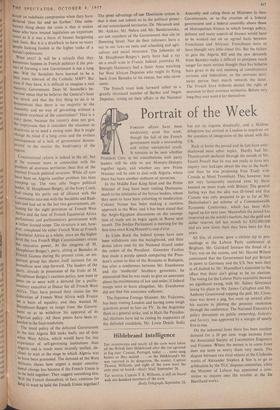BAZAAR BARGAINING
By DARSIE GILLIE ONLY a stop-gap Government, but, oh, what a gap unstopped! The fall had one dramatic element and only one. M. Bourges-Maunoury was brought down by one man, M. Jacques Soustelle, formerly a Mexican ethnologist and archreologist and a leading intellectual of the Left, one of the first men to rally to General de Gaulle in 1940, now an old hand at politics and an ex-Governor of Algeria. It was M. Soustelle who rallied the score of Gaullists and swung probably as many Conservatives into voting against the Algeria Bill, even though its rejection would leave France without a Government when barely convalescent financially, with labour storms on the horizon and the farmers in a temper, with Algeria still torn by rebellion and the Algerian debate loom- ing up at New York.
A large part of the Right had been itching to bring the Government down but was afraid to do so. The authority of a distinguished intellectual like M. Soustelle, knowing Algeria and the world at large and an intimate of the General since the dark days of the war, gave the Tory back- woodsmen a feeling of being covered against the charge of ignorant partisanship. The fall of the Government under the converging fire of Right and Left-140 Communists as well as a score of Left-wing critics of the Bill led by M. Mendes- France on one hand, and about 120 Right-wing Deputies on the other—indicates one of the gravest features of the crisis, the lack of any majority in the present Assembly. Even the 253 Deputies who voted for the Bill have a deep division run- ning through their midst, for the hundred Socialists have so far refused to participate in the same Government with representatives of the sdventy MRPs. How can a respectable anti- clerical be seen in public with a man who goes to Mass? It would not be so bad if France did have to be ruled by a minority Government for the time being, were it not that the defeat of the, last one on the Algeria Bill shows the dislike 01 the Right for any measure of self-government Or Algeria, even though it starts by asserting the; the country is an integral part of France aa° goes on to break it into half a dozen pieces before granting any of them limited self-government' There is union to put down the rebellion, but Ile majority for what is to follow.
Not even a majority for the inconclusive thiag that the Algeria Bill had first been and the still more inconclusive one that it had become. 1; always had the drawback of having been draftee with an eye on the Deputies in Pdris rather thall on the inhabitants of Algeria. It was a devil e get something past the Right .with little thcligb,t, of suiting the Arabs. The process of adjusting " to meet Right-wing objections had deprivi :4 it of such attraction for them as it once possessed' For the prospect of putting Algeria togethe! again, two years after self-government had hoc'' launched on a provincial basis, had beCOIlle 3 shadowy possibility instead of a definite Pre' supposition. The authority of a Governmeat which allows its Bills to be redrafted for it at 3 round-table conference of party leaders who earl' not even guarantee that they speak for theif rtY followers can never be high. That of a Pa leader who, like M. Mollet, allows importat"it ,peP points to which he is committed to be out of the Bill must also suffer. So for alit' matter must that of Right-wing leaders W13° Ac:ept an indefinite compromise when they have declared 'thus far and no further.' One satis- factory thing about the crisis is that it makes those who have treated legislation on important issues as if if was a form of bazaar bargaining look fools. But it is a drawback to have so many ' People looking foolish in the higher ranks of a nation's politicians.
What next? It will be a miracle (but they sometimes happen in French politics) if the pro- cess of forming a new Government is not a long °Ile. Will the Socialists have learned to be a little more tolerant of the Catholic MRP? But even if they have, it is difficult to imagine a real majority Government. Does M. Soustelle's be- haviour mean that he believes the General'S hour has struck and that the first thing to do is to demonstrate that there is no majority in the Assembly and no way of governing without a complete overhaul of the constitution? That is a risky game, because the country does not give the impression that it considers the situation so disastrous as to need a strong man. But it might change its mind if a long crisis and the evident c°nsequences of a lack of government demon- strated to the masses the bankruptcy of the egime.
Constitutional reform is indeed in the air, but at the moment more in connection with the problem of overseas territories than that of the internal French political structure. While all eyes have been on Algeria another problem has been creeping up. The very able Negro political le
ader, M. Houphouet-Boigny, of the Ivory Coast, hL
1- swung his party out of alliance with the Communists into one with the Socialists and Radi- cals and had sat in the last two governments, ob- taining for the eight provinces of French- West Africa and the four of French Equatorial Africa parliaments and parliamentary government with a rather limited scope. The structure is not, how- ever, completed for either French West or French Equatofial Africa as a whole, since on the higher level the two French High Commissioners retain Hie. executive power. At the congress of M. Houphouet-Boigny's party, sitting at Bamako in
French Guinea during the present crisis, an im- portant group has shown itself insistent for an innnediate next step forward. The leaders of the
',My, already in possession of the fruits of M. Houphouet-Boigny's cautious policy, now want to
Press on at once with a demand for a parlia- mentary executive at Dakar for all French West Africa. They have pressed their claims for the
federation of French West Africa with France O n a basis of equality, and they wanted M. Houphouet-Boigny to resign from the Govern- n'ent so as to withdraw his approval of its Algerian policy. All these points have been re- corded in the final resolution.
The timid policy of the defeated Government in the lost Algeria Bill looks badly out of date
When West Africa, which would have far, less experience of self-governing institutions than Algeria and is much more recently unified, de- clines to wait at the stage to which Algeria was to have been promoted. The demand of the West
Africans shows how urgent a major constitu- tional change has become if the French Union is to be held together. They suggest something else. Will the French themselves, in fact, continue for long to want to hold the French Union together?
The great advantage of our Dominion system is that it does not submit us to the political power of our emancipated territories. Dr. Nkrumah and Mr. Azikwe, Mr. Nehru and Mr. Bandaranaike, are not members of the Government that sits in Downing Street. Nor do their followers have a say in our laws on rents and schooling and agri- culture and social insurance. The followers of M. Houphouet-Boigny's party have had a say on a small scale in France. Indeed, yesterday M. Bourges-Maunoury had a Sister Anne watching for West African Deputies who might be flying back from Bamako to his rescue, but who never came.
The French must look forward either to a greatly increased number of Berber and Negro • Deputies, voting on their affairs in the National Assembly and ruling them as Ministers in their Governments, or to the creation of a federal government and a federal assembly above those of Metropolitan France in which foreign policy, defence and many aspects of finance would have to be worked out on an agreed basis between Frenchmen and Africans. Frenchmen seem to have thought very little about this. But the failure to pass the Algeria Bill and the new demands from Bamako make it difficult to postpone much longer far more serious thought than has hitherto been given to the real meaning of constitutional revision and federalism, as the overseas terri- tories pursue their march towards the latter. The French have hitherto denied the right of secession to their overseas territories. Before very long they may want it for themselves.























































 Previous page
Previous page